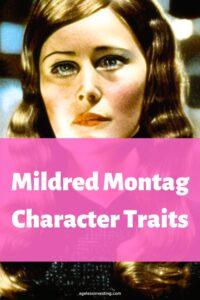In Fahrenheit 451, Mildred Montag’s behavior and attitudes starkly reflect the novel’s critique of a society absorbed by superficial entertainment and averse to introspection or intellectual engagement.
Her husband, Guy Montag, undergoes significant change, but Mildred clings more to her shallow lifestyle of entertainment and conformity.
Fahrenheit 451 Quotes With Page Numbers

Mildred Montag Character Traits
Mildred overdosed: Early in the novel, Mildred experiences a drug overdose, which is portrayed as an almost routine, albeit jarring event, in a chillingly nonchalant revelation. She downplays the incident, denying that she could have willingly taken all the pills.
“You took all the pills in your bottle last night.” “Oh, I wouldn’t do that,” she said, surprised. “The bottle was empty.” “I wouldn’t do a thing like that. Why would I do a thing like that?” she asked.
Ray Bradbury, Fahrenheit 451, Mildred and Guy Montag, Page 17
Obsession with Television: Mildred’s primary occupation is watching television, specifically her ‘family,’ on wall-sized screens that dominate the rooms of their home.
Her fixation on these screens is so intense that she longs for a fourth TV wall, emphasizing her deep immersion in the media and detachment from reality. She considers the TV characters her true family, suggesting a lost sense of human connection and community.
“It’s really fun. It’ll be even more fun when we can afford to have the fourth wall installed. How long you figure before we save up and get the fourth wall torn out and a fourth wall-TV put in? It’s only two thousand dollars.”
Ray Bradbury, Fahrenheit 451, Mildred Montag, Page 18
Seashell radio: In addition to television, Mildred is attached to a ‘seashell’ radio, a device that continuously feeds noise into her ears.
This constant auditory input from the futuristic earpiece functions as a means of escape and a symbol of her disengagement from the real world around her, fostering a mental environment obstructed by broadcasted distractions.
“And in her ears the little Seashells, the thimble radios tamped tight, and an electronic ocean of sound, of music and talk and music and talk coming in, coming in on the shore of her unsleeping mind. The room was indeed empty.”
Ray Bradbury, Fahrenheit 451, The Narrator about Mildred, Page 10
Fahrenheit 451 Technology Quotes
Infatuation with speed: Amidst fleeting moments of clarity, Mildred expresses an alarming delight in driving recklessly fast to escape her feelings.
She not only equates this dangerous act with a sense of liberation but also shows a disturbing indifference toward the potential for harming animals, or even people, in her high-speed escapades.
This behavior reflects her disconnection from the value of life and the thrill she derives from the sensation rather than a genuine joy.
“I always like to drive fast when I feel that way. You get it up around ninety-five and you feel wonderful. It’s fun out in the country. You hit rabbits, sometimes you hit dogs.”
Ray Bradbury, Fahrenheit 451, Mildred Montag, Page 61
Selective/Lost memory: Mildred Montag can’t recall where or how she first met her husband, Guy Montag, a gap of ten years wiped from their shared history.
This lapse in memory emphasizes the pervasive emptiness in their relationship and highlights the emotional distance created by their society’s shallow values, as depicted in Ray Bradbury’s “Fahrenheit 451.”
“She laughed an odd little laugh that went up and up. “Funny, how funny, not to remember where or when you met your husband or wife.”
~Ray Bradbury, Fahrenheit 451, The Narrator about Mildred, Page 40
Betrayal: Mildred’s ultimate betrayal comes when she informs the authorities about her husband Guy’s secret possession of books.
This treachery is not merely against her husband but also symbolizes her complete capitulation to the oppressive societal norms that vilify books and intellectual curiosity, favoring the shallow comforts of her screen-filled existence.
The character of Mildred Montag is emblematic of Bradbury’s critique of a society increasingly dominated by technology and passive consumption. The cost is a profound loss of depth in personal relationships, self-awareness, and cultural value.
She embodies the consequences of a disconnected society, sedated by omnipresent media and numbed to the essence of human experience.
Her actions and preferences paint a picture of an individual mired in a superficial life, punctuated by moments of denial and evasion. This ultimately leads to the disintegration of her marriage and the little humanity that remains in her world.